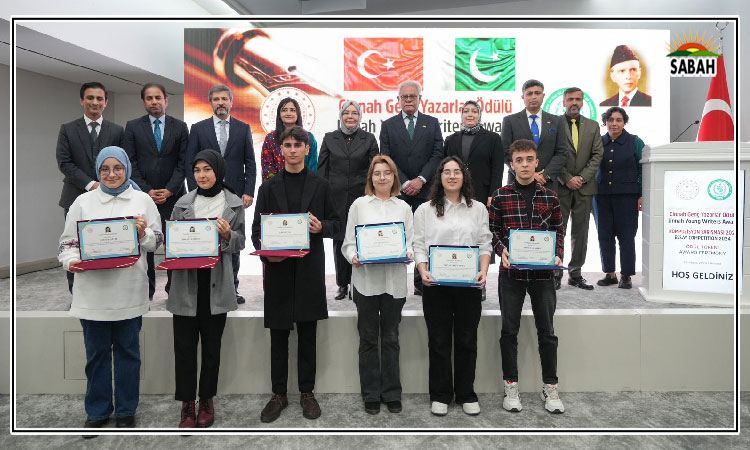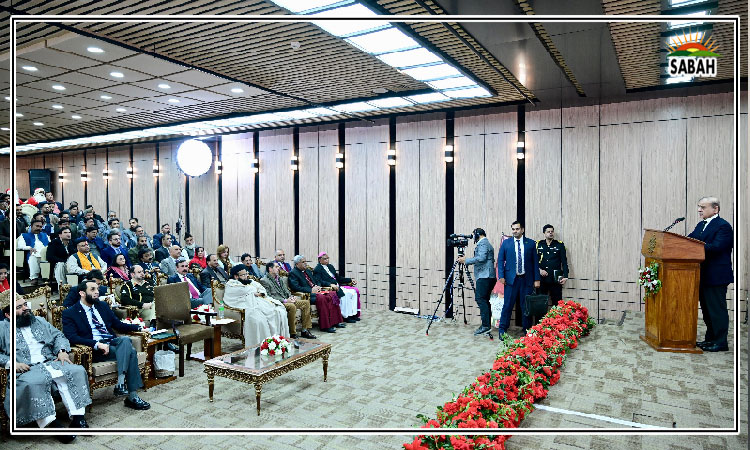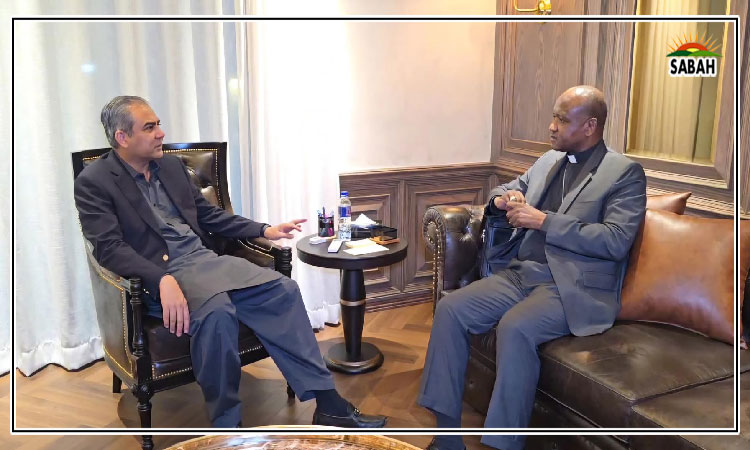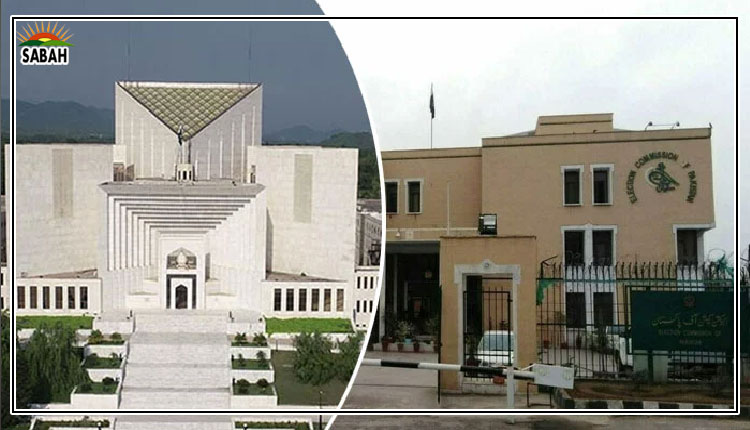Election Commission of Pakistan files petition in SC seeking a review of the latter’s order on holding polls in Punjab on May 14
ISLAMABAD, May 03 (SABAH): The Election Commission of Pakistan (ECP) filed on Wednesday a petition in the Supreme Court of Pakistan seeking a review of the latter’s order on holding polls in Punjab on May 14, saying that the verdict was “per incuriam (lacking regard to the law or the facts) to the Constitution, law and previous judgments”.
In a unanimous judgment on April 4, a three-member bench of the apex court led by Chief Justice of Pakistan justice Umar Ata Bandial had fixed May 14 as the new date for elections to the Punjab Assembly, after quashing the electoral body’s decision to extend the polls date from April 10 to Oct 8.
It had also directed the government to release Rs21 billion for the elections in Punjab and Khyber Pakhtunkhwa and provide a security plan to the ECP regarding the polls. Keep the court in the loop regarding the government’s measures, the top court had added.
However, the ECP had, in reports submitted to the top court in the subsequent days, blamed the federal coalition for being reluctant in releasing the funds.
The ECP had said that staggering polls by holding them for Punjab and KP assemblies were not feasible since it would incur significantly more expenses compared to holding the exercise on one day. It had also taken the view that an already depleted security apparatus would require weeks in advance for its movement.
With fewer than two weeks to the May 14 election date ordered by the court, the election commission filed its plea, which is yet to be fixed for hearing.
In a review petition filed through Advocate Sajeel Shehryar Swati on Wednesday — which comes a day after the government and PTI developed a consensus on holding elections across the country on the same day but are yet to decide on a date — the ECP urged the SC to review its April 4 verdict on multiple grounds.
The application stated that “the framers of the Constitution have given the judicial institution a pivotal role in safeguarding and preserving the Constitution, but have at the same defined the ambit and scope of judicial intervention under sub-article 2 of the Article 175 of the Constitution”.
The law mentioned above says: “No court shall have any jurisdiction save as is or may be conferred on it by the Constitution or by or under any law.”
The electoral body said that the superior courts in Pakistan had been granted a special power by the Constitution to judicially review actions and decisions taken by public bodies, but “never substitute their own decision in lieu of the public bodies”.
“The superior courts can define the contours within which the power (which vests in the public bodies) is or is to be exercised. At no instance, can the superior courts take upon themselves the role of the public body. With utmost deference, the appointing of the date for the election is not the mandate of superior courts under the Constitution.
“Such power exists elsewhere under the Constitution but certainly does not lie in a Court of law,” the plea pointed out.
Therefore, it highlighted, while passing the order on April 4, the court “disregarded its constitutional jurisdiction and assumed upon itself the role of a public body in giving a date [for elections]; thus intervention by the Court is necessitated to correct an error which has effectively changed the settled constitutional jurisprudence of the country.”
The petition also highlighted the “trichotomy of power”, saying that the division of power between different organs of the state was the “hallmark of the Constitution” and “essential sine qua non” for the smooth and efficient functioning of the country.
“This well-embedded constitutional concept isolates the three organs from interfering and treading into the domain of the other. The judicial institution has been conferred the power to judicially review the actions and decisions of the executive while at the same time being restrained from exercising the executive authority itself.”
The commission highlighted that the announcement of the date of general elections was “vested in the bodies” and not the judicial institution as per the Constitution.
“Therefore the impugned order under review, humbly submitted, has breached the salient principle of the trichotomy of powers and thus is not sustainable,” it stated.
The ECP explained that the conduct of free, just, and fair elections in accordance with the law was the “sole responsibility” of the commission.
It went on to say that the Constitution had assigned the task of appointing the date for general elections to the governor (in case of the dissolution of a provincial assembly) or the president (if the provincial assembly stands dissolved by efflux of 48 hours).
“But for a change of the date, the Constitution is silent, and Section 58 of the Election Act, 2017, comes into play.” The law allows the ECP to alter the election programme at any given time.
The ECP petition recalled that the SC, in its March 1 order regarding holding elections to the Punjab and KP assemblies within 90 days, had relied upon Section 57 of the Elections Act, 2017 to designate the president as authority for the appointment of date where the assemblies stood dissolved by efflux of time.
“The Hon’ble Supreme Court identified an authority for announcing the date for the general elections (i.e. the president) by interpreting the constitution as well as the law and restraining itself from appointing a poll date, keeping in view the well-entrenched principle of trichotomy of powers.
“The order under review [April 4], submitted with utmost humility, also goes contrary to the spirit of the order dated 01.03.2023 where this august court found the repository of the power being president under section 57 of the Constitution to appoint a poll date for general elections where the assemblies stood dissolved by efflux of 48 hours. It is also not conceivable why this Hon’ble Court took upon itself the task of appointing a poll date which certainly is not the constitutional function, respectfully submitted, assigned to the judicial organ of the state,” the plea added.
It reiterated that the change of the election programme was solely the domain of the ECP, adding that the SC “should have exercised judicial restraint” instead of appointing the election date itself and had therefore made the commission “virtually toothless”.
“Without a strong commission, the honesty, fairness, and above all, the integrity of the elections cannot be ensured.”
Moreover, the ECP highlighted that it could only perform its constitutional duties and functions if the requisite aid was provided by the federation and the provinces.
But, it highlighted, that as of today neither the funds for elections were released nor the security concerns of the commission had been met.
“In an environment that is politically polarised and political parties are at loggerheads to the extent that they are intolerant of each other’s existence, and the security risks are dire, the holding of general elections would not be free, fair, and honest.
“It is these factors that prevailed upon the commission while passing the order impugned in the original proceedings — something which this Hon’ble Court apparently did not consider in its true perspective. Without a secure environment, no election can be held in a free and fair manner nor can the consequent election results be considered sanctified,” the ECP added.
Furthermore, the commission highlighted that the Constitution needed to be read as a whole and no provision of the Constitution could “override, stultify or vitiate” another provision.
“In case of any conflict, the different provisions of the Constitution have to be harmonised and read together and in case of conflict the provision containing a lesser right has to yield in favour of the provision containing a higher right/norm,” it stated.
The petition said that Article 218(3) of the Constitution — which states that it was the duty of the ECP to organize and conduct the elections — contained a “higher norm” that Article 224 which entailed the 90-day requirement for holding polls as it contained the “foundational principles for creating a meaningful constitutional democracy in the country”.
“The duty to hold elections within 90 days is a constitutional imperative and command which cannot and should not be ignored but at the same time the duty to hold elections honestly, freely, and fairly is fundamental to the very existence of the constitutional democracy; without such fairness, the very spirit of the Constitution itself shall stand defeated.”
The plea further stated that in the presence of an elected government in Punjab, it was not possible to hold free and fair elections to the National Assembly because the newly-elected provincial setup would be able to “influence” the elections.
It elaborated that Punjab and KP had 173 and 55 national assembly seats respectively out of 326 total seats of the National Assembly, which made it about 53 per cent of the total for Punjab and 16pc for KP (cumulatively about 72pc) of the total strength.
“The general elections to the national assembly are due in the near future, as National Assembly is completing its term in August 2023. In order for the Commission to perform its constitutional duties to conduct the general elections honestly, justly, fairly, and in accordance with the law, the Commission requires the government machinery which is non-partisan and has no inclination towards any political party.
“If elections to the national assemblies are held while permanent governments are in place in Punjab and KP (73pc of the total national assembly seats), the sanctity, objectivity, and fairness of the elections to 73pc of the general seats of the National Assembly would inevitably be compromised,” the ECP stated.
In conclusion, the petition said that Article 254 of the Constitution — which states that the failure to comply with the requirement as to time does not render an act invalid — should not be used to “stultify the constitutional imperative of holding elections within 90 days” and the court should instead “keenly look at the ground realities”.
“In view of the aforesaid, it is most respectfully prayed that this August Court may graciously accept the instant Review Petition by revisiting, reviewing, reconsidering, and recalling its Impugned Judgment dated 04.04.2023, in the interest of justice and equity,” it added.
Separately, PTI leader Fawad Ahmed Chaudhry has asked the SC to immediately stop the caretaker chief ministers of Punjab and KP to stop working in their respective cabinets.
“Our petition in this regard should instantly be fixed for hearing,” he tweeted, referring to the PTI plea seeking to get the caretaker chief ministers removed after their constitutional terms of 90 days were complete.
Fawad Chaudhry said until elections were held, administrators should be appointed to run the provinces, stressing that caretaker governments could not function beyond the 90-day stipulated time. “The Constitution only recognises representatives appointed by the public,” he added.












